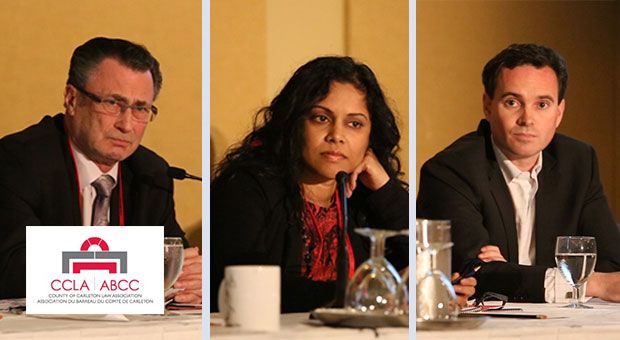
To purchase this video please click “Add to Cart”.
Login to watch this video if you have a subscription. Learn more about subscriptions.This panel will also focus primarily on substantive criminal law issues relating to counsel’s ability to effect criminal law policy as well as the uses counsel can make of evidence such as parliamentary debates, testimony of government officials before parliamentary and senate committees, and government proclamations. Professionalism issues that will be addressed will include:
The Honourable George Baker, former MP for the riding of Gander - Grand Falls (Newfoundland and Labrador) was first elected to the House of Commons in 1974, and was re-elected at every subsequent federal election. During his distinguished parliamentary career, he has served as Parliamentary Secretary to the Minister of Transport from 1975 to 1976, Parliamentary Secretary to the Minister of Fisheries and Environment from 1975 to 1976, and as Parliamentary Secretary to the Minister of National Revenue in 1976. In Opposition, he served as Party Critic for Atlantic Development in 1989, and Associate Party Critic for the Treasury Board in 1990. From 1999 to 2000, George Baker served as Minister of Veterans Affairs. In this portfolio, he successfully negotiated a $50 million compensation package for veterans of Canada's merchant navy - an issue that was very close to his heart. Since 1993, he has also served on the House Standing Committees on Finance, Trade and Economic Affairs, Fisheries and Oceans, Miscellaneous Estimates, Transport, Government Operations, and Procedure and House Affairs. Mr. Baker studied political science and economics at Memorial University of Newfoundland and at the University of New Brunswick. He was formerly Chief Clerk of the Newfoundland House of Assembly, serving concurrently, from 1967 to 1968, as Secretary of the Commonwealth Parliamentary Association. George Baker also worked as a contract producer for CBC, for music drama and arts in Newfoundland. Mr. Baker is currently a member of the Fisheries and Oceans Senate committee. He is also the Deputy Chair for the Legal and Constitutional Affairs Senate committee.
Ian Carter is a partner at Bayne Sellar Boxall. He joined the firm in 2008 after practicing for four and a half years in Vancouver with prominent criminal defense lawyer E. David Crossin, Q.C. He received his B.A. from McGill University in 1995. He subsequently worked as a television reporter and anchor for a number of years in Ontario and Western Canada. He completed his L.L.B. at Queen’s University in 2002 where he was the recipient of numerous awards, including the Blakes Scholar Award given to the student with the highest academic standing. After graduating, Ian then served as a law clerk at the British Columbia Court of Appeal before being called to the bar in British Columbia in 2003. He is an executive member of the Canadian Bar Association National Criminal Justice Section and has appeared on behalf of that association at a Senate committee on proposed criminal legislation. Ian was the 2014 recipient of the Regional Senior Justice Award, given to a member of the County of Carleton Law Association who has made an outstanding contribution as a litigator or solicitor.
Professor Mathen joined the Faculty as Associate Professor in 2011. She teaches Constitutional Law, Criminal Law, and Comparative Civil Liberties. Prior to joining the University of Ottawa, Professor Mathen was a member of the Faculty of Law, University of New Brunswick. From 1994-2001, she was Counsel and, later, Director of Litigation for the Women's Legal Education and Action Fund (LEAF) undertaking equality rights litigation before the Supreme Court of Canada and other courts. Professor Mathen's primary area of expertise is Canadian constitutional law. She has authored works on the Charter of Rights, the division of powers, the separation of powers, constitutional litigation, comparative constitutional law and constitutional theory. She also has published in criminal law, legal pedagogy, and feminist legal theory. Her current scholarship is focused on the doctrine of arbitrariness, section 1 of the Charter, the nature of judging and the role of social media in criminal justice. In 2010 (with Kim Brooks) Professor Mathen published Women, Law and Equality: A Discussion Guide (Irwin). Professor Mathen was one of the first legal academics to live tweet from the Supreme Court of Canada. She is one of the faculty's most active media commentators, appearing on such programs as The Current, Power and Politics, CTV National News, The Agenda, and BBC The World. She has published numerous op-eds and is regularly cited in national print and online media.
Leo Russomanno practices exclusively in criminal law. He graduated from the University of Ottawa with a law degree in 2007 and obtained a Master’s Degree in International Politics from Carleton. He has tried all manner of cases from sexual assault, robbery, firearms, drug cases, terrorism, and murder. Leo also taught criminal law classes in the Law and Legal Studies Department at Carleton University for four years, and regularly guest lectures at the Faculty of Law at the University of Ottawa. As an Ottawa Director of the Criminal Lawyers’ Association he is often invited to speak to Parliamentarians on criminal legislation.